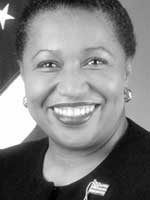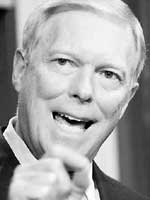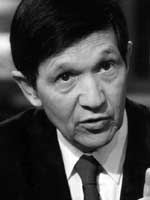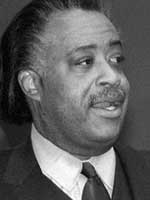Perhaps it’s surprising that most Democratic candidates are now speaking out on media ownership and deregulation of the public airwaves. It may be less surprising that most of their positions became known only after a grassroots campaign highlighted the public’s discontent with the FCC vote last June to further deregulate the media. Either way, after decades of regulation rollbacks, ownership concentration and commercialism of news, issues that progressives have been active on for decades seem to have made it to the spotlight of mainstream politics.
 |
Carol Moseley Braun
She has a history of working for diversity in media, fighting against the elimination of tax credits to minority broadcasters by the FCC in 1995 and working with the National Association of Black Journalists to foster diversity in the media workplace. She lost some of these battles, and minorities still own only 3.8 percent of the nation’s TV and cable channels and radio stations. She has been silent on the FCC battles. As ambassador to New Zealand she oversaw that country’s promise to adhere to international copyright and trademark laws enforced by the United States. She supported the 1996 Telecommunications Act, which rolled back FCC regulation.
|
 |
Wesley Clark
While enjoying a late-entry surge in coverage as a media darling, Clark has virtually nothing to say about media—although his comments to Aaron Brown on CNN defending Michael Moore’s right to speak out against the war during the Academy Awards may bode well for this ex-general’s media policies and respect for diverse opinion. He said, “People in the armed forces not only respect dissent, they expect dissent, as long as it’s directed at the policies, not the people.”
|
 |
Howard Dean
It’s to be expected that Dean is a great proponent of all things wired. Credited with revolutionizing campaigning and fundraising on the Internet, he knows his constituency well. He’s said that “universal Internet access should be a federal goal” and associated himself with Laurence Lessig, a main proponent of open source and the public domain. But while his online campaign, blogging and talk of bottom-up strategy is considerable, he has skirted taking a position on the legislation posed to extend copyright, perhaps because many of his supporters are executives in the entertainment industry. Dean also is very critical of the FCC deregulation, saying that it was “one of the foremost issues on citizens’ minds” and that the proposed actions would threaten free speech and free discussion. He praised congressional delay of the deregulation in mid-September, endorses a permanent reversal and even states that “we need to consider going even further than that by reregulating media ownership.”
|
 |
John Edwards
This Southern populist also jumped on the criticism of Michael Powell’s FCC proposals, capitalizing on how they would even further concentrate media outlets in his rural constituencies. He co-sponsored legislation to reverse the decision, saying that it “exemplifies everything that is wrong with this administration,” that Powell had “betrayed the public trust,” and that “he and the FCC must be stopped.” Unfortunately, one gets the impression that Edwards is more interested in protecting the “diversity” of Billy Graham’s evangelistic meetings than true progressive voices. He has a history of supporting digital divide and broadband legislation and fighting for privacy issues around the commercial use of data. “I believe that consumers, not dot-com companies, should have the power to control the use and disclosure of buying habits, financial and medical records, and other personal information.”
|
 |
Dick Gephardt
The career Representative from Missouri made only a squeak during the FCC imbroglio, calling the decision “anticonsumer and anticompetition.” Perhaps his history of support (alongside Republicans Billy Tauzin and Trent Lott) for Andrew W. Levin when he was a contender for an FCC commissioner slot in 2001 might have some bearing on his tepid stances on media. Levin recently got the job of senior vice president-government relations for none other than Clear Channel Communications.
|
 |
John Kerry
He was one of the most outspoken candidates regarding the FCC rollback of regulations, but it didn’t help him as much as other candidates. He said the FCC decision “represents the continuation of a conscious pattern—a new kind of institutionalized unfairness” and that “Maverick Republican Teddy Roosevelt understood the dangers of corporate consolidation, but the point seems lost on Mr. Bush.” He was quick to work in the Senate to nullify the FCC’s vote, saying, “The FCC should do more than rubberstamp the business plans of narrow economic interests.” Kerry has sponsored broadband tax credit legislation, was an original supporter of the E-Rate and said the FCC and the Bush administration had shown a “disheartening” lack of interest in closing “the very real digital divide.” He supported the 1996 Telecommunications Act.
|
 |
Dennis Kucinich
He is the only candidate to come out openly in favor of copyright reform with concrete policy ideas. He has written extensively on his blog—and also was a guest on Lessig’s—about media concentration, stating that if he were president he would use the Justice Department to break up media monopolies and require all FCC license holders to provide free airtime to candidates for federal office. He mentions “public airwaves” and the Federal Communications Act of 1934, which set specific responsibilities for broadcast license holders to serve “in the public interest, convenience and necessity.” He also says that, as president, he would appropriate more money for public TV and radio. He is against prosecutions for file sharing, embraces open source and Lessig’s Creative Commons initiative and is critical of restrictive “proprietary” licenses. He also is very outspoken on the digital divide and privacy issues related to the Internet, saying that the Patriot Act is “not reflective of Jeffersonian Democracy. This is Kafka’s The Trial writ large.”
|
 |
Joseph Lieberman
Lieberman represents the quintessential right wing of the Democratic Party and shows it regarding media. Lieberman labeled the FCC vote a “cause for concern” and pledged, “As president, I will watch carefully to see if these rules work to the detriment of the American people and, if they do, I will take necessary action.” While he did vote for the resolution of disapproval in September, his defense of big business and free trade is well documented. He praises the “magic of the Internet” and wants to develop a national strategy and implement tax incentives to promote high-speed technology. He believes a key trade priority must be to prevent foreign piracy of U.S. intellectual property and has tried to stake a claim as the “high-tech candidate,” garnering the endorsement of many high-tech executives. He supported the 1996 Telecommunications Act.
|
 |
Al Sharpton
While short on policy positions, he is characteristically, though not necessarily consistently, outspoken about issues of diversity in the media and minority ownership and representation. In 2002 he spoke out against the proposed merger of EchoStar and Hughes satellite providers, and in 1999 he criticized the merger of Viacom and CBS, seeking assurances that minority money managers would be involved and minority entities would receive an appropriate amount of advertising dollars. His short-term, and ill-conceived, hook-up with Michael Jackson to decry record company profits fizzled but his dedication to ground-up activism will keep him in the debate, although, as he rightly points out, marginalized by mainstream media.
|
Williams Cole is a contributing editor of the Brooklyn Rail and a former Fulbright scholar in media at the London School of Economics. He also is a documentary filmmaker currently producing a film about New York under Rudy Giuliani.







